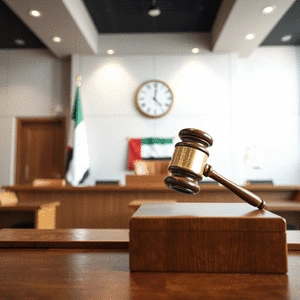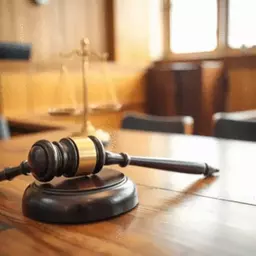Understanding UAE Criminal Trials

Posted on: 2025-08-14
By: Nadia Al-Farsi
Understanding the intricacies of the criminal trial process can be daunting, especially in a unique legal environment like the UAE. However, knowledge is power. By familiarizing yourself with the fundamental aspects of this system, you can navigate it with confidence and clarity.
What You Will Learn
- The UAE criminal justice system blends traditional Islamic law with modern legal principles, enriching the approach to justice.
- Understanding the UAE Penal Code helps clarify the classification of crimes into felonies, misdemeanors, and violations.
- Key judicial institutions like the Federal Supreme Court and the Dubai Courts play crucial roles in case management and jurisdiction.
- Defendants in the UAE have fundamental rights, including the right to legal representation and a fair trial.
- Variations in criminal trial processes can occur across different emirates, affecting court hierarchy, legal procedures, and sentencing practices.
- Taking proactive steps, such as seeking legal advice early, is essential for anyone involved in a criminal trial to navigate the complexities effectively.
Overview of the Criminal Trial Process in the UAE
This visual outlines the key components and hierarchy of the criminal trial process in the UAE, highlighting the classification of crimes and the roles of judicial institutions.
Classification of Crimes
- Felonies: Serious offenses.
- Misdemeanors: Less serious offenses.
- Violations: Minor infractions.
Judicial Institutions
- Federal Supreme Court: Highest court for constitutional matters.
- Dubai Courts: Handle most civil and criminal cases in Dubai.
- Abu Dhabi Judicial Department: Similar role in Abu Dhabi.
Legal Procedures
- Filing Complaints: Specific procedures outlined.
- Evidence Handling: Must adhere to legal standards.
Sentencing Practices
- Variability: Sentences may vary by emirate.
- Custom Considerations: Local customs impact sentencing.
Understanding the Criminal Trial Process in the UAE
When stepping into the world of legal proceedings in the UAE, it’s essential to grasp the *criminal trial process* and the framework that supports it. The UAE Penal Code and the Criminal Procedure Law form the bedrock of this system, outlining the rights of individuals and the responsibilities of the authorities. Think of these legal documents as a comprehensive guidebook that ensures everyone is treated fairly and justly within the legal realm. For more in-depth information, you can explore various criminal defense strategies in Dubai.
The UAE's legal system may seem daunting, especially for those unfamiliar with it. However, understanding these foundational laws can empower individuals, helping them navigate through the complexities of criminal justice. At Dubai Legal Defense, we are dedicated to making this knowledge accessible to everyone, ensuring that individuals know their rights and options.
Contextual Overview of the UAE Criminal Justice System
The UAE criminal justice system is unique, blending traditional Islamic law with modern legal principles. This combination enriches the legal landscape, ensuring a diverse approach to justice. As we dig deeper, you’ll see how this system functions to protect both individual rights and public order.
Understanding the *UAE Penal Code* helps clarify how offenses are defined and categorized. Here’s a brief overview of key elements:
- Classification of Crimes: Crimes are divided into felonies, misdemeanors, and violations.
- Legal Procedures: The law outlines specific procedures for each type of offense.
- Enforcement Guidelines: Authorities must adhere to established protocols when enforcing the law.
Key Judicial Institutions and Court Hierarchy
In the UAE, several key judicial institutions play crucial roles in the administration of justice. Understanding the court hierarchy is vital for anyone involved in a criminal trial. Each court has its own jurisdiction and powers, affecting how cases are handled.
Here's a simple breakdown of the major courts in the UAE:
- Federal Supreme Court: The highest court, dealing with constitutional matters.
- Dubai Courts: Handle most civil and criminal cases in Dubai.
- Abu Dhabi Judicial Department: Similar to Dubai Courts, overseeing cases in Abu Dhabi.
Detailed Criminal Trial Procedures in the UAE
As you prepare to navigate the criminal trial process, it’s essential to understand how it all begins. The initial steps can feel overwhelming, but breaking them down can provide clarity and confidence. Here, we’ll cover how the criminal process is initiated and what to expect as the trial unfolds.
Each stage is designed to uphold the rights of the accused while ensuring a fair trial. With the right information, you can approach each step with greater knowledge and assurance. Always remember, at Dubai Legal Defense, we’re here to help you make sense of these proceedings.
Pro Tip
When preparing for a criminal trial in the UAE, consider engaging a local attorney who specializes in criminal law. Their expertise in navigating the unique aspects of the UAE legal system can greatly enhance your chances of a favorable outcome. Additionally, familiarize yourself with your rights and the specific procedures relevant to your case. Knowledge is your best ally in the courtroom!
Addressing Common Questions About Criminal Trials in the UAE
When it comes to criminal trials in the UAE, many people have questions. Perhaps you’re wondering about your rights during trial or how the legal process works. It’s completely normal to feel a bit lost in this complex system! In this section, we’ll explore some of the most frequently asked questions surrounding criminal trials, and I'll share insights to help clarify these important topics.
Understanding the specifics can make a huge difference in preparation. I often encounter individuals who have misconceptions about what to expect in court. By addressing these common queries, I aim to give you a clearer picture of your rights and the support available to you. Remember, being informed is empowering!
Frequently Asked Questions: Clearing Up Misconceptions
Here are some common questions I hear about criminal trials in the UAE:
- What are the basic rights of defendants during a trial? Defendants have the right to a fair trial, legal representation, and the presumption of innocence until proven guilty.
- Can I hire a lawyer from outside the UAE? Yes, but they must be licensed to practice in the UAE. It's crucial to choose someone familiar with local laws.
- What if I don’t speak Arabic? Courts provide translation services, but having a bilingual lawyer can ensure smoother communication.
- What happens if I am found guilty? Sentencing options can vary. Understanding potential outcomes can help you prepare.
- How long does a criminal trial typically last? The duration varies greatly depending on the complexity of the case, from a few weeks to several months.
- Is plea bargaining common in the UAE criminal justice system? While not as formal as in some Western systems, informal negotiations can occur, but convictions often require strong evidence.
- What is the role of Sharia law in criminal trials? Sharia law is a fundamental source of legislation, influencing areas like personal status and certain criminal offenses, often alongside codified laws.
- Are there options for appeal if convicted? Yes, defendants generally have the right to appeal to a higher court within a specified timeframe.
These questions are just a starting point. At Dubai Legal Defense, I work to ensure you have access to the information you need to navigate your legal challenges confidently. If you have more specific questions, don’t hesitate to reach out! You can also learn more about criminal lawyers in Dubai.
Comparative Insights: Variations Across Emirates
Interestingly, the criminal trial process can differ across the various emirates in the UAE. While the overarching legal framework is similar, local regulations and practices can vary quite a bit. Here’s a brief overview of some key differences:
- Court Hierarchy: Each emirate has its own court system, which may affect how cases are handled.
- Legal Procedures: Some emirates may have unique procedures for filing complaints or handling evidence.
- Language Considerations: In areas with a high number of expatriates, courts might offer more translation services.
- Sentencing Practices: Variations in how sentences are determined might exist, depending on local customs and laws.
Understanding these nuances is crucial, especially if you find yourself facing legal challenges in a specific emirate. It’s always a good idea to consult with a legal professional who is well-versed in the local system, like those at Dubai Legal Defense, to help you navigate these differences effectively.
Concluding Thoughts on Navigating Criminal Trials in the UAE
Summary of Key Points to Remember
As we wrap up our discussion on criminal trials in the UAE, it’s vital to remember the key points we’ve covered. Your rights as a defendant, the importance of legal representation, and the variability across different emirates all play significant roles in your legal journey. I encourage you to keep these insights in mind as they can shape your experience in the courtroom. For more details on this topic, you can also consider information about navigating criminal trials in Dubai.
Taking Action: Next Steps for Those Involved in Criminal Trials
If you or someone you know is involved in a criminal trial, take action! Seek legal advice as soon as possible and stay informed about your rights. Being proactive can make all the difference in navigating the complexities of the legal landscape here in Dubai. At Dubai Legal Defense, we’re here to empower you with the knowledge you need to advocate for yourself effectively. Don’t hesitate to reach out for assistance—your legal journey is important, and you don’t have to face it alone! Understanding defendants' legal rights in Dubai is crucial for anyone involved in the legal process.
Recap of Key Points
Here is a quick recap of the important points discussed in the article:
- Understanding Legal Framework: Familiarize yourself with the UAE Penal Code and Criminal Procedure Law, which outline individual rights and legal procedures.
- Judicial Institutions: Recognize the roles of key courts such as the Federal Supreme Court, Dubai Courts, and Abu Dhabi Judicial Department in the trial process.
- Defendant Rights: Remember that defendants have the right to a fair trial, legal representation, and presumption of innocence.
- Variations Across Emirates: Be aware that criminal trial procedures and practices can differ among the emirates, impacting case handling.
- Seek Legal Assistance: Engage a qualified lawyer familiar with UAE laws to navigate the complexities of your case effectively.
 In the rapidly evolving financial landscape of Dubai, understanding white-collar crime is not just a
In the rapidly evolving financial landscape of Dubai, understanding white-collar crime is not just a
 Facing a criminal conviction can feel like being trapped in a labyrinth with no clear way out. Howev
Facing a criminal conviction can feel like being trapped in a labyrinth with no clear way out. Howev
 In a world where the juvenile criminal justice system is often viewed through a punitive lens, Dubai
In a world where the juvenile criminal justice system is often viewed through a punitive lens, Dubai